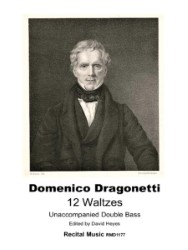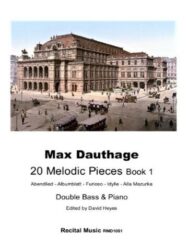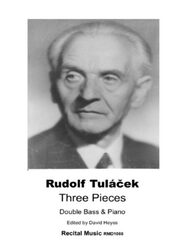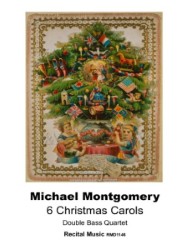A Night at the Opera: Act One
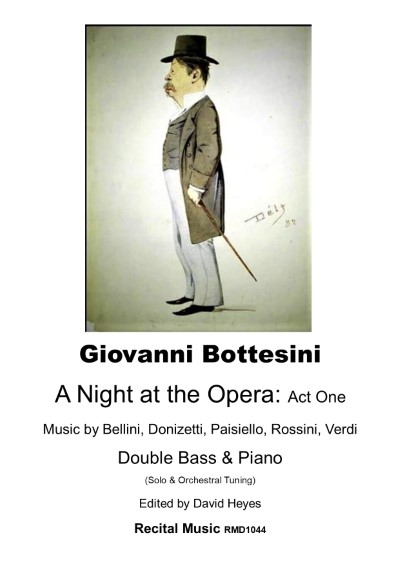
Composer: Various
Editor: David Heyes
Instrumentation: Double Bass and Piano
Publisher:
| Product Code: | RMD1044 |
| Publishers Number: | RMD1044 |
| Language: | English |
| Condition: | New |
2. Giuseppe Verdi (1813-1901) – Air d’il Trovatore
3. Vincenzo Bellini (1801-1835) – Final de la Sonambule
4. Gaetano Donizetti (1797-1848) – Romance de L’Elisire d’Amore
5. Giovanni Paisiello (1740-1816) – Nel Cor Più Non Mi Sento
6. Gaetano Donizetti (1797-1848) – Chi mi frena in tal momento
A Night at the Opera: Act One brings together six Italian opera arias for double bass and piano, arranged by Giovanni Bottesini. Four were included…
The arias are charming and accessible, ideal for anyone who is studying thumb position and the solo register of the double bass, and this new edition by David Heyes also includes accompaniments for both solo and orchestral tunings.
The world of opera has long inspired composers and players to plunder the best arias and melodies to transcribe for other instruments. The double bass is no exception and Bottesini’s operatic fantasias are still at the very heart of our solo, Repertoire into the 21st-century. It’s difficult to keep a good tune down!
A Night at the Opera: Act One
1. Gioacchino Rossini (1792-1868) – Sérénade du Barbier de Séville
The Barber of Seville was composed in 1816 and is probably Rossini’s most popular opera. Taken from Act One, Se il Mio Nome Saper Voi Bramate (If You Would Like to Know My Name) is a Romanza sung by Count Almaviva (baritone).
2. Giuseppe Verdi (1813-1901) – Air d’il Trovatore
Il Trovatore dates from 1852-53 and the Scena & Aria: Il Balen Del Suo Sorriso (Bright her Smile) is sung by the Count (baritone) in Act Two.
3. Vincenzo Bellini (1801-1835) – Final de la Sonambule
La Sonnambula (The Sleepwalker) dates from 1831 and Bottesini used themes from the opera for his operatic fantasia for double bass and piano. D’un Pensiero e d’un Accento (Oh, believe me, I never harbor’d) is from the end of Act One and is a duet for Amina (soprano) and Elvino (tenor).
4. Gaetano Donizetti (1797-1848) – Romance de L’Elisire d’Amore
L’Elisire d’Amore (The Elixir of Love) dates from 1832 and this popular tenor aria is sung by Nemorino (tenor). Romanza: Una furtive lagrima (A furtive tear) is from Act Two, Scene 3.
“Technically it doesn’t appear demanding and with its 40 bars taking only three minutes, it will become a welcome addition to my small stack of playable favourites.” [Double Bassist]
5. Giovanni Paisiello (1740-1816) – Nel Cor Più Non Mi Sento
The opera L’amor contrastato, better known as La Molinara (The Miller-Woman) was composed in 1788 and is long forgotten apart from this aria, originally performed as a duet by Rachelina (soprano) and Calloandro (tenor) in Act Two. The melody was used by Bottesini as a theme and variations for double bass and piano (or orchestra) and has also been used by Beethoven, Sor, Hummel, Boehm, Vanhal and Paganini.
6. Gaetano Donizetti (1797-1848) – Chi mi frena in tal momento
Lucia di Lammermoor, composed in c.1835, is one of Donizetti’s finest tragic operas and Bottesini used a number of themes for his operatic fantasia for double bass and piano. Chi mi frena in tal momento (What from vengeance yet restrains me) is originally a sextet from Act Two and Bottesini uses the solo register of the double
bass, including harmonics, to create a beautifully powerful and lyrical work which demonstrates the sonorous and cantabile qualities of the instrument.
About the Composer
“How he bewildered us by playing all sorts of melodies in flute-like harmonics, as though he had a hundred nightingales caged in his double bass… I never wearied of his consummate grace and finish, his fatal precision, his heavenly tone, his fine taste. One sometimes yearned for a touch of human imperfection, but he was like a dead shot; he never missed what he aimed at, and he never aimed at less than perfection.” [H.Haweis, 1888]
Giovanni Bottesini (1821-1889) was the greatest double bass virtuoso of the 19th- century, and many of his compositions for double bass are still at the heart of the solo, Repertoire today. He spent much of his life in the opera house as a conductor, and composer and his music is inspired by the lyrical, cantabile, and virtuosic pyrotechnics of 19th-century Italian opera. Bottesini was known as ‘the Paganini of the double bass’ and was one of the greatest musical superstars of his day.
R.R.P £10.00
Our Price: £8.00
Digital Download – PDF
Shipping costs: No shipping
You might also like
-
12 Waltzes for Double Bass
£6.80 -
20 Melodic Pieces Book 1
£6.80 -
3 Pieces for Double Bass and Piano
£10.00 -
6 Christmas Carols
£10.00

